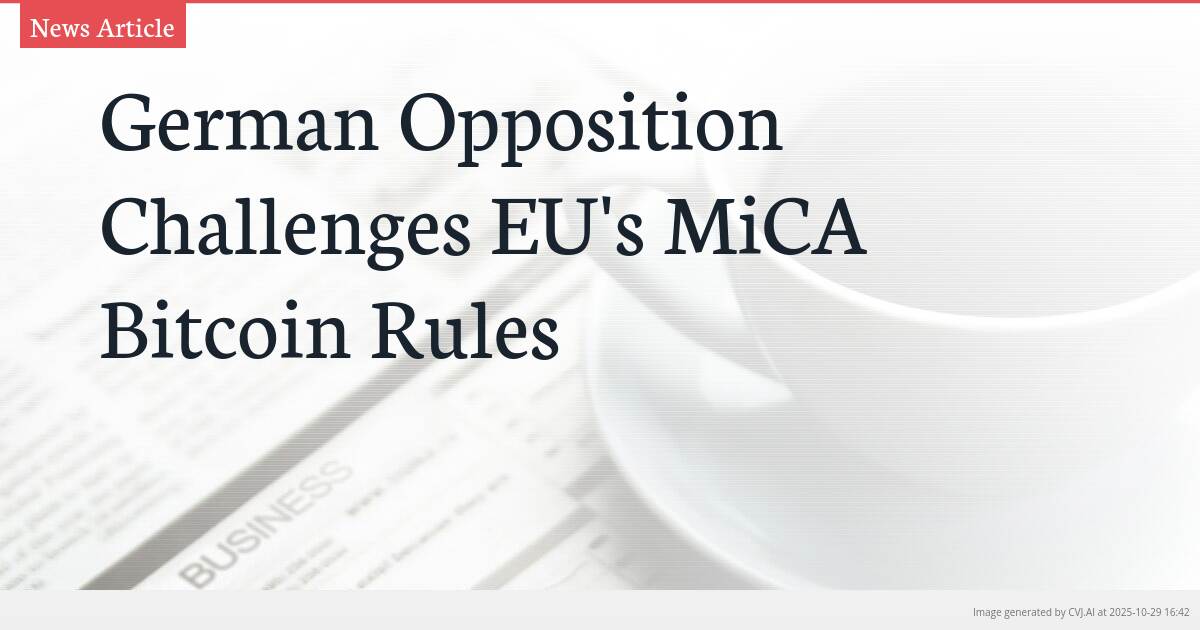This summary text is fully AI-generated and may therefore contain errors or be incomplete.
Introduction
Germany’s main opposition party is mounting a significant challenge to European cryptocurrency regulation, arguing that Bitcoin’s unique characteristics warrant exemption from the upcoming Markets in Crypto-Assets (MiCA) framework. The Alternative for Germany (AfD) has submitted a formal parliamentary motion to the Bundestag seeking special recognition for Bitcoin as a fundamentally different digital asset that requires a distinct regulatory approach. This development signals growing tensions between standardized EU regulation and the distinctive nature of decentralized cryptocurrencies, potentially reshaping how Bitcoin is treated across European markets.
Key Points
- AfD argues Bitcoin's decentralized structure distinguishes it from other crypto assets requiring different regulatory treatment
- The motion seeks German government recognition of Bitcoin as a unique digital asset deserving strategic approach
- This challenge could influence how EU member states implement MiCA regulations for different cryptocurrency categories
The Parliamentary Challenge to MiCA
The German Bundestag is set to review a groundbreaking motion filed by the Alternative for Germany (AfD) that directly challenges the application of Europe’s comprehensive crypto regulatory framework to Bitcoin. Submitted on Thursday, the official parliamentary document represents the first significant political pushback against treating Bitcoin under the same regulatory umbrella as other crypto assets. The motion specifically targets the Markets in Crypto-Assets (MiCA) framework, which is designed to create uniform cryptocurrency regulations across the European Union.
The AfD’s motion argues that Bitcoin’s decentralized structure and fundamental design principles distinguish it from other digital assets that may function more like traditional financial instruments. This distinction forms the core of their argument that Bitcoin should not be subjected to the same regulatory requirements as centralized cryptocurrencies or tokenized assets. The parliamentary challenge comes at a critical time as EU member states prepare to implement MiCA regulations, potentially setting a precedent for how different cryptocurrency categories are treated across Europe.
Bitcoin's Unique Status Argument
Central to the AfD’s motion is the assertion that Bitcoin represents a fundamentally different class of digital asset that deserves separate regulatory consideration. The document emphasizes Bitcoin’s decentralized nature, its fixed supply mechanism, and its operation outside traditional financial systems as key differentiators. This argument challenges the one-size-fits-all approach of MiCA, suggesting that regulatory frameworks must account for the technological and philosophical differences between various types of digital assets.
The motion calls for the German government to formally recognize Bitcoin as a unique digital asset category that requires a strategic approach distinct from other cryptocurrencies. This recognition would acknowledge Bitcoin’s role as a decentralized store of value rather than treating it as just another financial instrument. The AfD’s position reflects growing sentiment among cryptocurrency advocates that regulatory frameworks must evolve to accommodate the unique characteristics of different blockchain technologies rather than applying blanket regulations across the entire digital asset space.
Implications for European Crypto Regulation
The German parliamentary motion could have far-reaching consequences for how MiCA regulations are implemented across the European Union. As Europe’s largest economy, Germany’s approach to cryptocurrency regulation often influences other member states’ policies. If the Bundestag adopts the motion’s recommendations, it could prompt other EU nations to reconsider how they categorize and regulate different types of digital assets under the MiCA framework.
This development highlights the ongoing tension between standardized EU regulation and the diverse nature of cryptocurrency technologies. The MiCA framework was designed to create regulatory harmony across European markets, but the AfD’s challenge suggests that some political factions believe certain digital assets require specialized treatment. The debate could lead to more nuanced regulatory categories that distinguish between decentralized cryptocurrencies like Bitcoin and more centralized digital assets that function similarly to traditional financial products.
The outcome of this parliamentary motion will be closely watched by cryptocurrency exchanges, investors, and regulatory bodies across Europe. A decision to grant Bitcoin special status could create regulatory fragmentation within the EU’s single market, while rejecting the motion might reinforce the comprehensive approach of MiCA. Either way, the German parliament’s deliberation on this issue represents a critical moment in the evolution of European cryptocurrency regulation and could establish important precedents for how decentralized digital assets are governed in the future.
📎 Read the original article on cointelegraph.com

